Combining the capabilities of Google Translate with Google Search has long been a feature of international search experiences – but somewhat in the background. Not anymore. Google this week rolled out a feature across the non-English speaking world, which gives users the option to extend their search to other languages with the results presented in their own language and based on the keyword search conducted in their own language.
Take the example below from Google Poland where the search term “Pozycjonowanie stron” – or as some of us know it, “Search engine optimisation” – has been searched for within the new category of “Pages from Translated Languages” on the left hand side under the “Pages from Country” and “Pages in Language” settings.
High speed global searches
In this category, Google does the following things:
- Translates the keyword on the fly to one which Google knows is well searched for in relevant target languages – the system works less well for less popular keywords.
- Based on the keyword, decides which languages to present.
- Searches the relevant index with the translated keywords.
- Creates a set of results based on what it considers to be the most relevant results from all language selections.
- Translates the results on the fly and presents them to the user as translated listings.
Take this example from Italy below where a search for “Voli” or “Flights” has brought back results in English, Spanish, German and French. A different search would produce a different set of selected languages. The arrows show the keyword in Italian in the search box and then again in Italian on www.skyscanner.net which is pulled from Skyscanner’s English pages which have then been translated by Google into Italian. Interestingly, Skyscanner already has a very professionally produced Italian version page which gives a much much more professional translation than Google’s rather sad attempt.
Sometimes, it does not work so well
In the Google France example below, the keyword “Acheter pc portable” or “Buy Laptop” in English, has picked up the Best Buy site in first place – but Google’s own system cannot translate the page so clicking on the initial link fails and goes to a page saying, “We’re sorry, we cannot translate this page”
What this does do is gives us a clue as to how many parameters Google is using to rank the pages – and it definitely does not fit the the usual “More than 200 parameters are used in the Google Algorithm” statement.
The original language of content displayed
The new approach does give the user strong clues as to the original language of the web contented presented in the results pages. In the page below, the pages from this Hungarian search for “Palacsinta” or “Pancakes”, presents results in both English – the first two results and the fourth shown – and German in the third result. The Hungarian language (see “Magyar” in the red circle top right) can also be changed to choose any one of Google’s core languages in a drop down menu.
Page titles do not play the same role
What is clear from our research is that the resulting page titles have little to do with the keyword search as you can see below in the Danish search for “Search Engine Optimisation” or “Søgemaskineoptimering”. As you can see, the keyword is only shown in the first and third result and not the second. The search results have more to do with the translated keyword than with the original term. In this case, “Søgemaskineoptimering” was translated into “SEO” for both English and German results.
Built in geographic bias
As the Google Norway search for “Video reklame” or “Video ads” shows below, the automatic selection of languages and thereby the choice of keyword is biased by the local geography. A search for video ads would not naturally choose the countries of Denmark and Sweden – the fact that they are geographically adjacent to Norway has to be large factor in this. So whilst the language selection is linked to keywords, the set of available languages is actually initially limited to the proximity of the countries – not the relevance of the search.
Automated language selection makes odd choices
However, despite the initial geographic bias of the language selection, as we can see in the Dutch example below, the varying selection of languages presented per keyword is sometimes odd and intriguing. Why would a Dutch search for “Luggage rack” or “Bagage drager” choose to present Arabic, Chinese (traditional) or Russian? Sadly, they have also made the horrendous mistake of assuming that “Traditional Chinese” is a language which it is not – it is merely a set of characters used by both Mandarin and Cantonese which really are languages.
Keyword weighting lower down than normal results
It is my belief that, because of the system Google is using, the weighting given to page titles is much lower than it would be in the normal results – see below – so the question is what is the weighting? Links have to be a major factor – but it seems that body content has a higher weighting than normal too.
The issues
Multilingual-Search.com will publish further analysis of the systems at play in this new development in the near future particularly looking at the following immediate questions which this poses for international search marketers:
- How to ensure that users are seeing good quality content in the results – does this mean preventing Google from translating pages?
- How their web pages are translated by Google Translate?
- Links just became even more important. Oh dear?
- What to do if your site suddenly receives lots of international traffic?

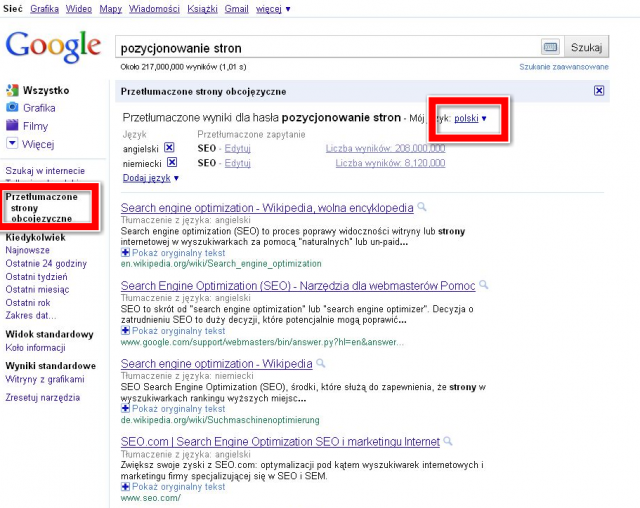
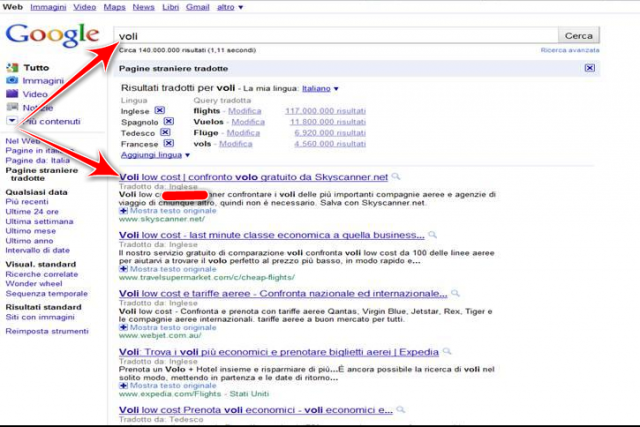
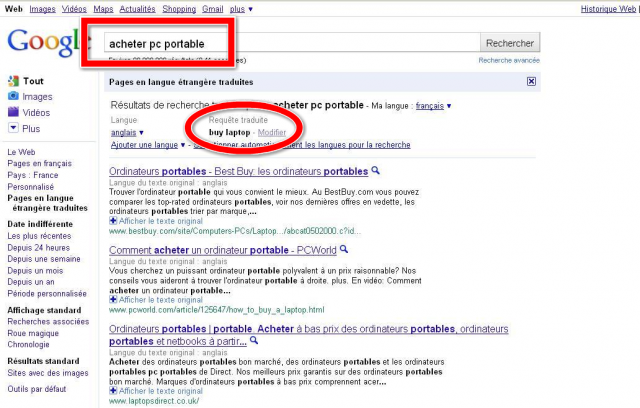
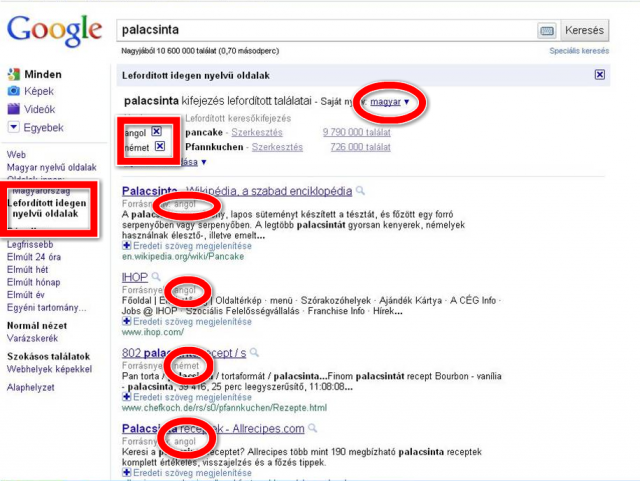

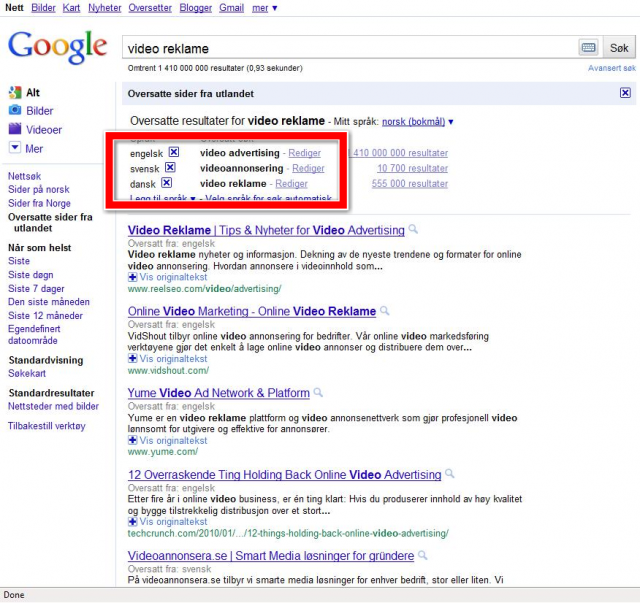
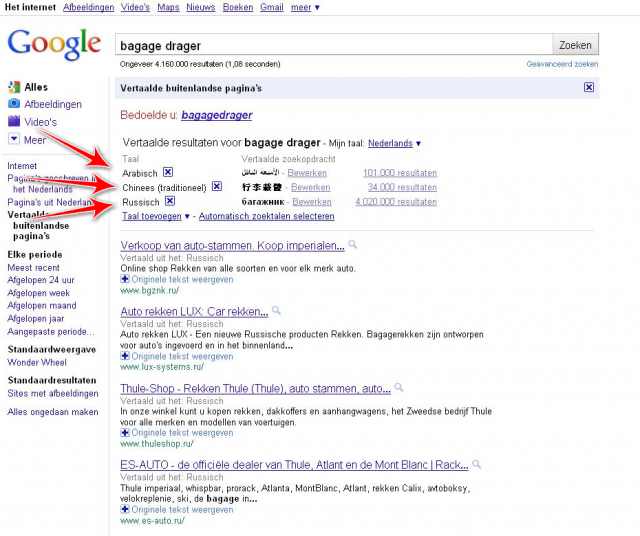
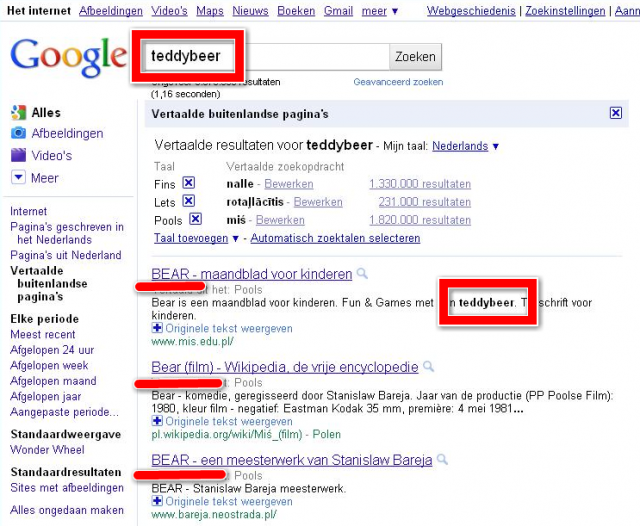







One Response
Hi, I’m curious as to what is the news source for this Google launch. I can’t find anything about it on the Google Translate blog.
Duncan